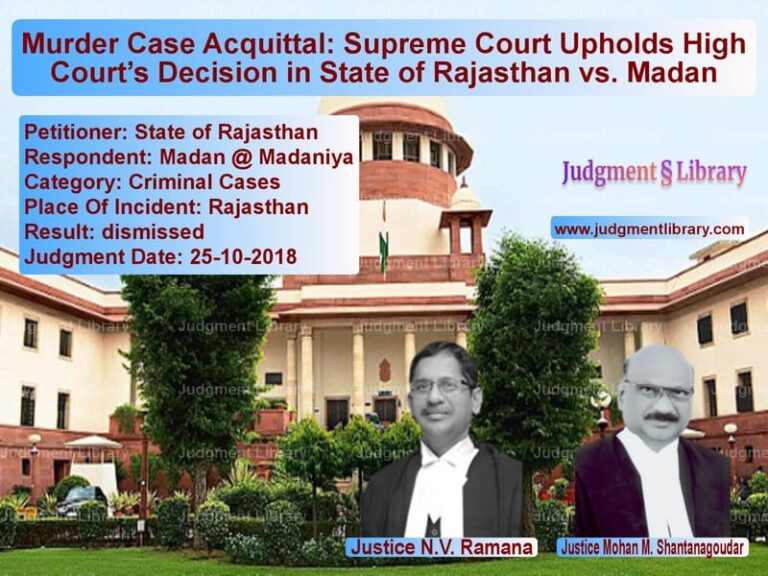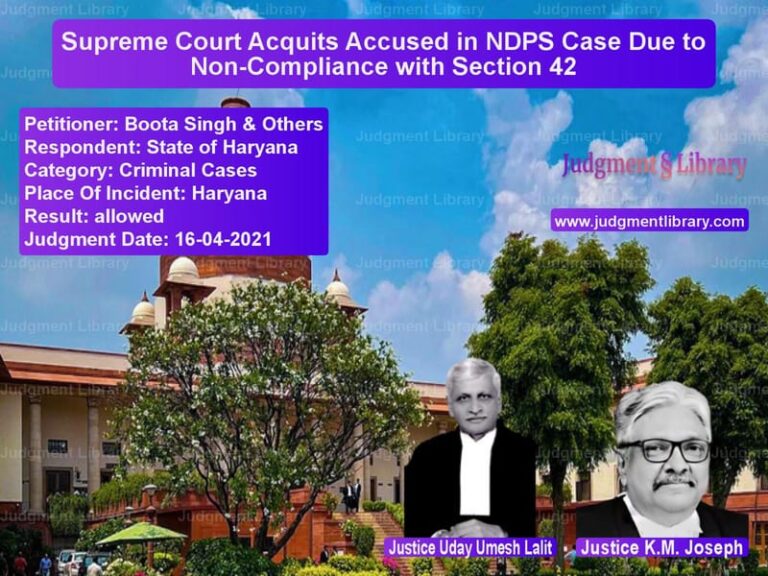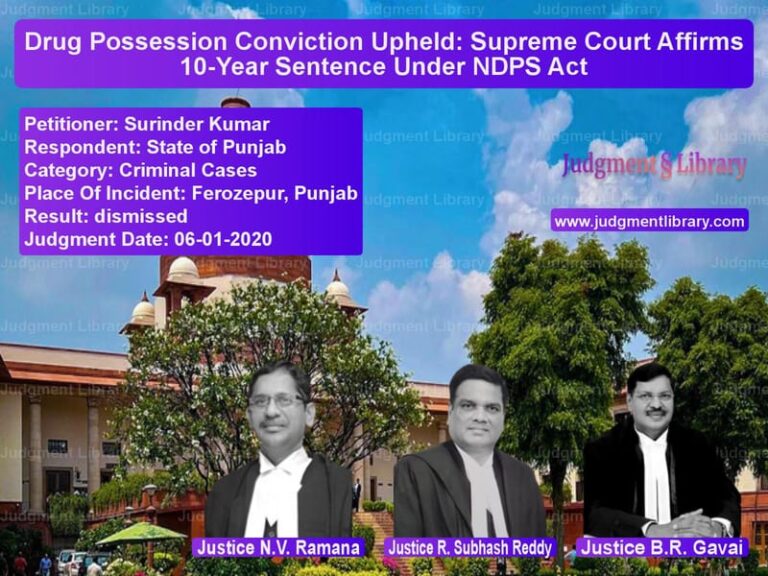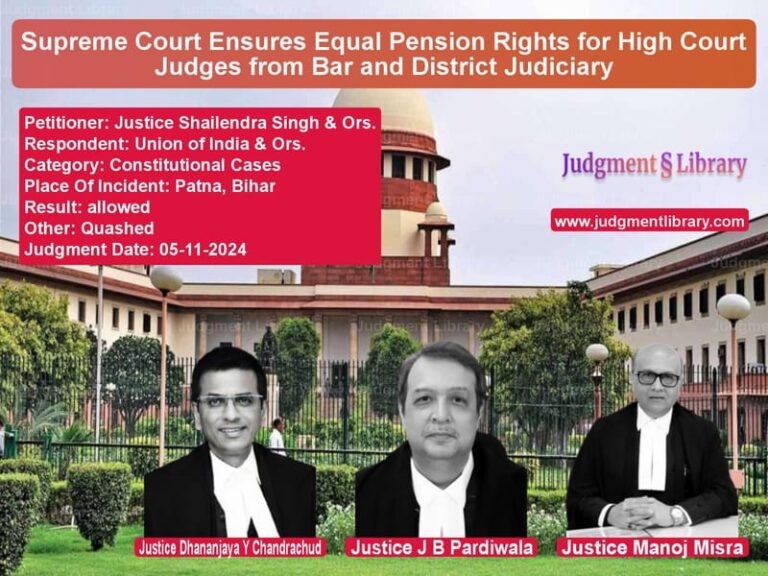Supreme Court Acquits Accused in SC/ST Act Case Citing Inconsistent Evidence and Lack of Public View
In a significant judgment delivered on April 7, 2025, the Supreme Court of India acquitted several accused persons in a case involving allegations under the Scheduled Castes and Scheduled Tribes (Prevention of Atrocities) Act, 1989 (SC/ST Act) and Section 447 of the Indian Penal Code (IPC). The case, titled Hutu Ansari @ Futu Ansar & Ors. vs The State of Jharkhand, highlights crucial aspects of evidence evaluation in cases involving caste-based allegations and the importance of establishing offenses beyond reasonable doubt.
Detailed Case Background
The case originated from a land dispute in Lohardaga, Jharkhand, involving:
- A 28-decimal land parcel (Khata No. 116 Plot No. 698)
- Previous litigation settled through Ext. 5 on 25.04.2005
- Alleged incident on 22.05.2005 at 7 am
- Complaint filed under Section 156(3) CrPC (Complaint Case No. 58/2005)
The prosecution alleged that:
- Accused trespassed into complainant’s house/land
- Used caste-based derogatory terms
- Stole household items worth ₹3,000
- Threatened and humiliated the complainants
Detailed Trial Proceedings
The case saw multiple stages of adjudication:
| Court | Decision | Sentence |
|---|---|---|
| Trial Court | Convicted all 9 accused | 3 months SI (IPC), 2 years SI (SC/ST Act) |
| High Court | Confirmed conviction | Enhanced to 6 months (SC/ST Act), 3 months (IPC) |
| Supreme Court | Acquitted appellants | Set aside all convictions |
Key Arguments Before Supreme Court
Appellants’ Submissions (Verbatim)
Mr. Braj Kishore Mishra, counsel for appellants argued:
“The case was foisted due to land dispute enmity…all prosecution witnesses are related…no independent witnesses…offenses under SC/ST Act not made out as alleged abuses not in public view.”
Key defense points:
- Land dispute history since 2005
- All witnesses were family members
- No public present during alleged incident
- Inconsistencies between complaint and evidence
State’s Counter-Arguments (Verbatim)
Mr. Vishnu Sharma, standing counsel for Jharkhand submitted:
“Trial court and High Court concurrently found accused guilty…caste abuses were proved…trespass established…no reason to interfere.”
Prosecution’s case rested on:
- Complaint allegations
- Witness testimonies
- Previous land dispute records
- Presumption under SC/ST Act
Supreme Court’s Detailed Analysis
1. Evaluation of Evidence
The Court meticulously examined witness statements:
“PW-1 categorically stated no villagers present during incident…PW-2 gave different version of abuses…PW-3’s testimony inconsistent with complaint…PW-4 mentioned different caste term…PW-6 didn’t support occurrence.”
Key evidentiary flaws identified:
- Place of occurrence differed between complaint (house) and evidence (field)
- No corroboration for theft allegations
- Varying accounts of caste-based abuses
- No independent witnesses
2. Application of SC/ST Act Provisions
The Court analyzed Section 3(1) clauses:
| Clause | Requirement | Court’s Finding |
|---|---|---|
| (f) | Wrongful land occupation | No evidence of forceful eviction post 25.04.2005 settlement |
| (r) | Intentional insult in public view | No public present as per PW-1 |
| (s) | Caste abuse in public view | Same as (r) – no public view established |
3. Trespass Evaluation
The Court noted:
“Complaint alleged house lock breaking but witnesses spoke of field incident…no evidence supports house trespass…contradictions fatal to prosecution case.”
Landmark Observations
The judgment made several significant observations:
- On Public View Requirement: “Abuses not in public view cannot attract Section 3(r) or (s)”
- On Witness Reliability: “Related witnesses’ inconsistent testimonies create reasonable doubt”
- On Land Dispute Context: “Previous litigation history relevant in evaluating motives”
- On Burden of Proof: “Presumptions under SC/ST Act don’t relieve prosecution of basic burden”
Final Judgment and Directions
The Supreme Court concluded:
“Gross inconsistencies between complaint and evidence…no offense under SC/ST Act made out…trespass not proved…convictions unsustainable.”
Specific directions included:
- Acquittal of all appellants
- Setting aside of Trial Court and High Court orders
- Cancellation of bail bonds
- Disposal of pending applications
Legal Significance
This judgment contributes to jurisprudence by:
- Clarifying ‘public view’ requirement under SC/ST Act
- Emphasizing need for consistent evidence in caste-based cases
- Highlighting careful scrutiny needed when all witnesses are interested parties
- Balancing special legislation protections with fundamental rights of accused
The detailed evidence analysis serves as an important precedent for similar cases involving the SC/ST Act.
Petitioner Name: Hutu Ansari @ Futu Ansar & Ors..Respondent Name: The State of Jharkhand.Judgment By: Justice Sudhanshu Dhulia, Justice K. Vinod Chandran.Place Of Incident: Lohardaga, Jharkhand.Judgment Date: 06-04-2025.Result: allowed.
Don’t miss out on the full details! Download the complete judgment in PDF format below and gain valuable insights instantly!
Download Judgment: hutu-ansari-@-futu-a-vs-the-state-of-jharkha-supreme-court-of-india-judgment-dated-06-04-2025.pdf
Directly Download Judgment: Directly download this Judgment
See all petitions in SC/ST Act Case
See all petitions in Bail and Anticipatory Bail
See all petitions in Theft and Robbery Cases
See all petitions in Property Disputes
See all petitions in Attempt to Murder Cases
See all petitions in Judgment by Sudhanshu Dhulia
See all petitions in Judgment by K. Vinod Chandran
See all petitions in allowed
See all petitions in Quashed
See all petitions in supreme court of India judgments April 2025
See all petitions in 2025 judgments
See all posts in Criminal Cases Category
See all allowed petitions in Criminal Cases Category
See all Dismissed petitions in Criminal Cases Category
See all partially allowed petitions in Criminal Cases Category






